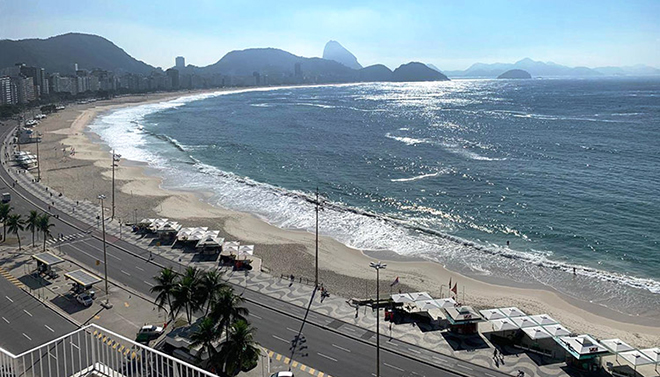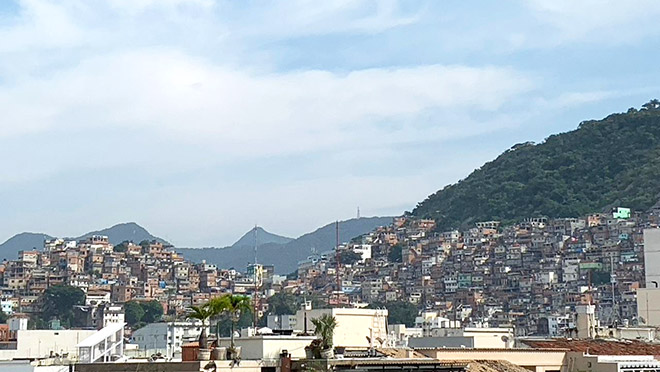NEWSLETTER
|
From Surreal to All Too Real: Coronavirus in Brazil By Shepard Forman
I have always found writing fairly easy and the best way to work out my thoughts. When I was asked a few weeks back to write something about the Covid-19 pandemic in Brazil, I accepted without question. A good way to track the arrival and spread, I thought, but I didn’t then appreciate the speed and intensity with which the disease would overtake us here and impose limitations on virtually every aspect of our daily lives and, importantly, on our thought processes and span of concentration.
I, like many of you, I suspect, spend much of my time simply keeping up, with the news, with loved ones, with my own fears, doubts and uncertainties. The caseload and the deaths are always a few paces ahead of us, and the abstraction of a pending pandemic has become the reality to which we are now all confined.
On February 27, a woman returning to São Paulo from Italy aboard Air France became the first reported positive for coronavirus in Brazil. My wife, Leona, and I arrived that same day in Rio de Janeiro, aboard another Air France flight, after a two-week holiday in Portugal. We had travelled aware of the outbreak of Covid-19 in Wuhan, China, but, like most observers at the time, underestimated the virulence and rapid spread of the virus.
After Air France suspended some flights to China, we took the precaution of wearing masks in flight and while transiting through Charles de Gaulle airport near Paris. Portugal, however, had no reported cases, and we travelled between Lisbon and Porto with friends from Wales, visiting museums, historic sites and gardens in our usual style of unhurried tourism, generally undaunted by what quickly became the global pandemic.
Over the next few weeks we eased back into our comfortable retiree lives in Rio. We celebrated our granddaughter’s fifteenth and my eighty-second birthdays, visited with friends, ate out, saw a couple of movies, walked along the ocean front. We watched with growing alarm as Covid-19 spread rapidly through Europe, then the United States, and began to quicken in Brazil while President Jair Bolsonaro followed Donald Trump in arrogant denial. “A little cold,” he said. “Why the hysteria?”
Two friends with whom we had dinner in Lisbon tested positive. Several more travelers returning to Rio and São Paulo from Italy and Spain developed symptoms or tested positive. Leona and I decided to self-quarantine for 14 days, during which I developed an unusual cold, scratchy throat and unyielding runny nose. I consulted our doctor to see if I should be tested. “Not yet,” he advised. We waited. Those two weeks passed but, while then symptom free, the frightening nature of the pandemic was now clear to us.
Leona and I have little to complain about, even as we watch in horror the unfolding tragedy around us. We are in “privileged quarantine”, overlooking Copacabana Beach and the mountains across the iconic Guanabara Bay, Rio’s UNESCO World Heritage site. We have not seen our daughter, Alex, or granddaughter, Lara, for six weeks, despite their neighboring proximity, but WhatsApp keeps us connected to them and to our son, Jacob, and his lifetime companion, Kris, sequestered in California.
WhatsApp and Zoom have become our lifeline, causing me to reflect on my days as a young anthropologist physically distanced from my parents, family and friends for years at a time while conducting fieldwork in inaccessible places where an exchange of letters took weeks and sometimes months. Now, technological choices like Zoom and WhatsApp enable us to “meet” regularly with friends and family, celebrate birthdays and anniversaries, and even mourn. We recently held a Zoom shiva for a 97-year-old cousin who died in a nursing home without the loving embrace and comforting rituals that in other times would have eased her passing.
A personal trainer leads us in thrice weekly live video sessions, with an added set of respiratory exercises. We order our groceries and medicines online, donning gloves and masks to receive and sanitize them at our kitchen door. We recently opened our building’s rooftop where we can walk as many miles as our aging legs permit while enjoying fresh air and sunshine with minimal risk of contagion.
We are now nearing 60 days in this privileged quarantine, constantly aware of the catastrophe that is unfolding around us. From our rooftop, I look across four city blocks to the conjoined high-density hillside communities of Cantagalo and Pavão-Pavãozinho, among the smaller of the approximately 200 favelas that are home to 2.5 million people, some 20 percent of Rio’s population. Dependent on a constitutionally mandated but highly neglected universal health care system, service jobs and the informal economy, they can neither stay at home nor social distance.
Magda Gomes, an engineer and founder of Rocinha Resiste, a community organization dedicated to the 100,000 residents of Rio’s most infamous favela, recently described their dilemma in stark terms: How do we social distance when we are living in multi-generation families of up to 12 people in 3 rooms? How do we continually wash our hands when we were without water for three days last week? How do we not go out to work when the $150 emergency assistance ($1,200 for female-headed households) will barely cover our basic needs? How do we stay at home when we are forced to line up at banks to receive the promised three monthly payments?
As of today, May 10, Mother’s Day, there are more than 100,000 officially counted Covid-19 cases in Brazil with nearly 10,000 related deaths—an astounding 10 percent mortality rate—paralleling the 10,500 confirmed cases and 1,100 deaths reported today in Rio. More startling is that two studies by highly respected health research teams estimate a mindboggling 8 to 16 times undercount in the number of cases and associated deaths, with a doubling expected over the next month.
While the spread of the disease here originated with travelers to and from major coastal cities with international airports (Rio, Sao Paulo, Fortaleza) and Manaus, capital of the state of Amazonas, the spread has rapidly moved to the working-class neighborhoods that surround and serve them, disproportionately threatening poor communities of black Brazilians and indigenous lands where missionaries, miners and land-hungry agro-industrialists carry with them the civilizational seeds of Covid-19.
Disturbingly, nearly 40 percent of cases are occurring among younger people in the 30 to 50 age range. With the pandemic’s onset about a month behind the U.S., and with similar impediments to the disease’s containment, Brazil may easily move from its current sixth place among the world’s most affected countries to number one!
This scenario is complicated by deep economic and political crises that have stymied Brazil’s growth and effective governance over the past decade or more. Systemic corruption at federal, state and municipal levels of government have diverted public funds from public goods to private gain. The arrest and confinement of captains of industry contributed to declining investment and stagnation of the private sector, especially the dominant construction trades. Severe economic contraction left some 13 million people jobless, even before the pandemic closed commerce and forced the ubiquitous informal street vendors back indoors.
Analysts predict negative growth for the foreseeable future and, conservatively, unemployment rates at 20 percent. Huge public debt strangles social services and an already overburdened safety net.
The much acclaimed, constitutionally mandated Unified Health System (SUS) that theoretically guarantees every Brazilian free health care in a network of public hospitals and clinics in every city and municipality in the country has been decimated by decades of declining investment. Vendors have long since ceased providing supplies and services for lack of payment. Doctors and nurses are inevitably drawn to private hospitals and clinics, and most public facilities are vastly understaffed at the best of times.
In short, a dysfunctional public health service was incapable of meeting regular demand let alone the onslaught of coronavirus.
Today, weeks short of every prediction of the disease’s peak, public and private hospitals are at nearly full capacity, with virtually no intensive care beds available despite reports of empty beds in some public hospitals. The army corps of engineers has been building field hospitals in urban areas, but with little expectation that they will adequately meet the need for beds, equipment or professional attendance. Rural areas with virtually no health infrastructure are left to their own devices.
As the saying goes here, there are two viruses doing the devil’s work in Brazil, Covid-19 and President Bolsonaro. Besieged by a hostile Congress and charges of corruption and political interference in the administration of justice to protect his sons from criminal investigations, Bolsonaro has from the outset downplayed the pandemic and its implications for Brazil. He manifests complete disregard for human life and suffering, famously declaring when confronted with stark numbers several week ago, “What do you want me to do? My middle name is Messias, but I don’t perform miracles.”
He defies public health experts who implore people to stay at home, urging those he calls “humble people”—domestic workers, street vendors, Uber drivers—to go out and seek work because there’s no public money to support them. He recently fired his respected health minister for supporting stricter isolation recommendations and forced the resignation of the popular Minister of Justice for refusing to appoint cronies to command police and investigatory positions.
As people around the world nightly applaud health care workers, Brazilians bang pots and pans to protest a president whose current popularity stands below 30 percent while his adoring support base gather to demand a reopening of commerce and public spaces and recently physically attacked nurses peacefully demonstrating the lack of PPE and life-saving medical equipment. As mayors and governors urge social isolation and respect for stay at home orders, and several have belatedly mandated state, city-wide or neighborhood lockdowns, Bolsonaro wades into crowds (one demanding a return to military dictatorship that he himself may have invoked), suggests throwing a barbecue on the grounds of the presidential palace and outrageously boasts, “I’m an athlete. This little flu is not going to get me!”
The private sector, both for- and not-for-profit, has been mobilizing to fill the widening gap. Industry and some banks have set up funds to provide people in need with food and sanitation supplies. Community-based groups are organizing to help their neighbors and distribute supplies as they are made available. One community-based newspaper has created an app where people can access up-to-date and truthful information of the spread of the virus and how to address it.
BrazilFoundation (full disclosure: founded by my wife) raised an unprecedented U.S. $1.5 million in just a few weeks to help its grantees provide basic food and sanitation kits in their underserved communities. VivaRio, a Rio-based global NGO, is mobilizing resources on a national basis.
Unfortunately, in the face of this pandemic, the fundamentals of race, class and gender inequality that have forever marked Brazilian society stand out in stark relief. The disquieting debate between life and livelihood, whether for individual survival or public policy, assumes monumental proportions. It is not a choice anyone should be forced to make.
Shep Forman is a former president of The LAFF Society. He worked at the Ford Foundation from 1977 to 1996, first in the Rio de Janeiro office and then in New York as Director of Human Rights and Governance and of International Affairs. He is Founder and non-resident Senior Fellow at the Center on International Cooperation at New York University.
|



